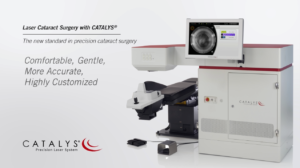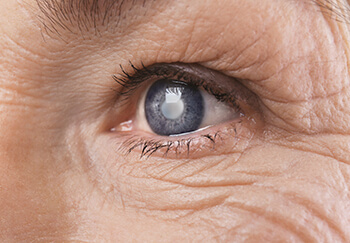CATARACT
Cataracts are very common, affecting roughly 60% of people over the age of 60, and over 1.5 million cataract surgeries are performed in the United States each year. Advances in Cataract surgery has turned it into a 10-15 minutes outpatient procedure where most patients resume normal activities the next day.
A cataract is a loss of transparency, or clouding, of the normally clear lens of the eye. Vision through eyes with cataracts is characterized as looking through a foggy window or piece of wax paper. Cataract development is usually a very gradual process of normal aging, but can occasionally occur rapidly. Many people are unaware that they have cataracts because the changes in their vision are so gradual. As one ages, chemical changes occur in the lens that make it less transparent. The loss of transparency may be so mild vision is hardly affected or so severe that no shapes or movements are seen, only light and dark. When the lens gets cloudy enough to obstruct vision to any significant degree, it is called a cataract. Glasses or contact lenses cannot sharpen your vision if a cataract is present.

The most common cause of cataract is aging. Other causes include trauma, medications such as steroids, systemic diseases such as diabetes and prolonged exposure to ultraviolet light. Occasionally, babies are born with a cataract.
Reducing the amount of ultraviolet light exposure by wearing a wide-brim hat and sunglasses may reduce your risk for developing a cataract but once developed there is no cure except to have the cataract surgically removed. Outpatient surgical procedures can remove the cataract through either a small incision (phacoemulsification) or a large incision (extracapsular extraction). The time to have the surgical procedure is when your vision is bad enough that it interferes with your lifestyle.
Cataract surgery is a very successful operation. One and a half million people have this procedure every year and 95% have a successful result. As with any surgical procedure, complications can occur during or after surgery and some are severe enough to limit vision. But in most cases, vision, as well as quality of life, improves.
SOME COMMON SYMPTOMS OF CATARACTS MAY INCLUDE:
- Painless blurring of vision
- Sensitivity to light and glare
- Double vision in one eye
- Poor night vision
- Fading or yellowing of colors
- Frequent changes in glasses or contact lens prescription.
LASER-ASSISTED CATARACT SURGERY TECHNOLOGY


What is laser-assisted cataract surgery?
Many of the steps of cataract surgery are traditionally performed using handheld tools. Now, they can be completed with the precision of a laser. Using the Catalys Precision Laser System, your surgeon can offer you unprecedented accuracy and customization in your cataract surgery procedure. Your surgeon can use the laser to create a circular opening for accessing and removing the cataract. Clinical studies have shown that this opening is more accurate when performed with the laser than what is achievable by hand. The laser then softens and breaks up the hard cataract into tiny pieces, allowing for gentler, easier cataract removal. Depending on your pre-operative vision and desired visual result, your surgeon may recommend a tailored treatment plan that could include creating ultra-precise laser incisions in the cornea and a specific lens implant type (e.g. The multifocal lens for near and far vision). This tailored treatment may reduce your need for glasses or contact lenses after surgery.
What are the benefits of laser-assisted cataract surgery?
- A highly customized treatment using advanced 3D imaging
- A treatment with little or no discomfort
- A more precise treatment with ability to better treat astigmatism
- A gentler and easier cataract removal
- Generally, a more rapid visual recovery due to reduced inflammation
- The opportunity to receive tailored treatment with advanced technology multi-focal lenses, which may reduce the need for glasses or contacts after surgery
Am I a suitable candidate for laser-assisted cataract surgery?
In our experience, most cataract patients are suitable patients for laser-assisted cataract surgery. Your doctor and his/her support staff will discuss your candidacy in more detail during your cataract evaluation exam.
How long has the procedure been performed?
Thousands of procedures have been successfully performed using the Catalys Precision Laser System, and lasers have been used in eye procedures for decades. Catalys laser represents the new standard in precision laser cataract surgery and was FDA cleared in 2011.
How does the laser work?
Every eye has a unique size and shape. Prior to treatment, the Catalys Precision Laser System scans your eye making a precise 3D map of relevant structures. This process enables your surgeon to create a highly customized treatment plan that is tailored for your eye. The laser then focuses light to create precise incisions exactly where intended. The laser makes the incisions in a matter of seconds. You should experience little, if any, discomfort.
What will I feel?
You can expect little or no discomfort during your treatment. During the laser portion, patients describe seeing kaleidoscope of lights and slight pressure only.
How long does the procedure take?
You can expect to be at the surgery center for 2 hours. You will be in the procedure room for 10 to 12 minutes. The 3D imaging and laser portion of the treatment only takes a few minutes.
How is your center different from other cataract surgery centers?
Catalys laser-assisted cataract surgery is all about better precision, more safety and excellent outcomes. Across the country, only a small number of specialized lasers are available and in use. At Milford Franklin Eye Center, Dr. Kaldawy was the first to offer bladeless laser-assisted cataract surgery in the area and among the first in New England. We are proud to bring this technology to the area. The top 5 teaching hospitals in the Nation offer bladeless laser cataract surgery. We offer the same. We perform the procedure in a state-of-the-art center in Milford and closer to home. No more need to travel miles and different trips to other inferior and more expensive centers. We implant high quality premium lenses, with correction for distance, near and everything in between. Our percentage of complications and infections is one of the lowest in the Nation. 100% of the surgeries are performed under topical anesthesia, so only drops, no need for shots and their risks and no need for stitches. Are you still being told to travel miles away from home to see other surgeons and have your surgery in a different far away center? We are available for a second opinion! With us, your relationship from start to finish will be directly with your own surgeon. We are proud to offer excellence in cataract surgery and world class outcomes closer to home.
